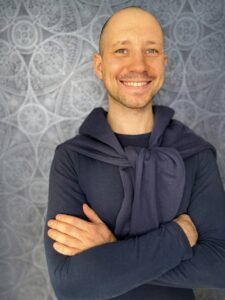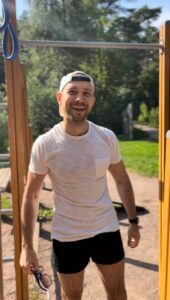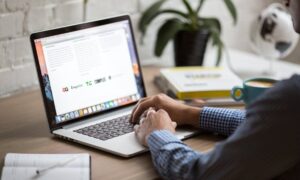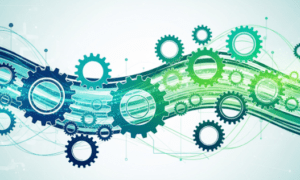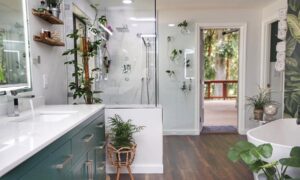Anton Sobe-Panek is one of the most active supporters of sustainable development. We talked about sustainable growth and improving the quality of life by using an eco-conscious approach.
TB: Anton, you are the most eco-conscious person I know. How did you get involved in a sustainable lifestyle?
Anton: I suppose it all started with my mother, who just didn’t let me eat junk food at all when I was a child. No Coca-Cola, no Snickers, etc. At that time I didn’t understand the meaning of those constraints, it was just a kind of unwritten law to me, but now, of course, I’m thankful to her.
One more thing is a habit to exercise, it was also instilled by my parents, so I’m still training almost every day, and feel great because of that.
But it was only when I was 25 years old that I didn’t feel the limits of training, not having enough sleep and working up to 14 hours a day when my body told me that it was not right – I had a hypertension crisis at the CrossFit training.
After that, I started to study everything about a healthy lifestyle and got quite good at it, even started reading lectures and share my experience. I stopped pumping iron, started to swim in the pool, stopped eating too much meat, started to eat more vegetables and fruits, normalized my sleep, limited work by 10 hours a day, etc. All that enabled me to normalize my biomarkers, including weight (lost more than 10kg), pulse, blood pressure, cholesterol, etc. And all that while increasing productivity and the feeling of happiness! Finally, last year I was even able to win the corporate “iron man” competition, by swimming 2km and cycling 30km every day for 30 consecutive days.
It was then that I got acquainted with the definition of health by WHO – “Health is a state of complete physical, mental and social well-being and not merely the absence of disease or infirmity”
So, I started to dig deeper, and, to make a long story short, came to a sustainable lifestyle – that just includes a healthy lifestyle, but adds other important aspects like ecology, finance, justice, equality, peace, safety, etc…
TB: Previously you worked as an eHealth managing director. That is a very unique name for the role. What did you do during that time? What were your day-to-day duties?
Anton: Actually, it was my obsession with biohacking that led me to that role. I just came to the management of the company where I worked at the time and suggested we should create this new business line.
So, after several iterations, I managed to create a 5-year investment strategy and approve it with the board of directors as well as with the governmental bodies, because we were planning to disrupt the whole national healthcare system.
So, my first task was to coordinate the creation of a portfolio of 5 daughter companies (telemedicine, ePharmacy, medical AI, electronic health records, and DNA tests). It’s work you can find within any VC fund or M&A department – you make vast research on the market, trends, regulation, competition, and existing investment activity, then you either find the targets and engage in the negotiations with them or decide to create a new entity from scratch, because you have a business case that it would be more beneficial for all the stakeholders. So, I would say, in 50% of cases we acquired, and in 50% we created.
TB: You mentioned that the results of business units increased x10 (to $70 M). How was it possible? What steps were made?
Anton: After that initial stage we had to integrate the newly acquired/created companies with the ecosystem of our corporation. That was more operational work, including the decisions about the product lines, sales channels, partnerships, improving efficiency, financial management, and overall business planning.
I’d especially emphasize my role in GR/lobbying/legislation as well as professional associations because we needed to the change laws to enable our business to grow exponentially – we had to make sure that you can receive a consultation online while using the data from your medical devices; ask the doctor online to renew your prescription and then order online the delivery of your medicines to your home; store all your medical data in a convenient app.
And then AI could assist your doctor in diagnostics and recommending the most appropriate treatment as well as use the results of your DNA tests to make the most precise and personalized decision.
I’d say, that, of course, in healthcare, you have to integrate your products and services into the existing insurance plans, so we made a great effort to enable all of our insurance clients to see the value and seize the opportunities that new technologies could provide them with.
TB: In your career, you also created and owned a sustainability strategy across the welfare ecosystem portfolio, including >200 sustainability initiatives. Can you please tell us more about those initiatives?
Anton: That’s exactly where we tried to realize that integral approach to health -> wellbeing -> sustainability. So our mission was to show our conventional healthcare customers that not only their financial well-being depends on other aspects of their lives (like health, career, education, or even happiness), but to completely change their perception of the very term “welfare” – shifting the focus from wealth to a more holistic approach – basically, to sustainability.
So, of course, we made up a plan, including projects to make if not all but most of our products and services sustainable – sustainable insurance, sustainable investments, transforming our financial management app into a personal life management app, etc.
We wanted to make sure that not only all the audiences (like disabled, elderly, migrants, veterans, etc) have an equal access to our products with the relevant pricing, but also they focus on the very aspects of sustainability (like healthcare, education, career, ecological safety, (cyber)security, etc).
We launched special ESG ETFs / indexes/funds, that, again, were more accessible than conventional instruments (with lower commissions and as less as 20$ as a minimum amount of investment), but we also tried to make sure that the assets we invest in are sustainable (helping to achieve these or that sustainable development goals and make a real impact to people). Overall we reached about $1bln in sustainable assets under management.
One important thing is that we addressed not only individuals but also corporate customers. We not only consult them on sustainability strategies, making diagnostics of their current states and helping to set their sustainability targets, but also we provided them with our sustainable insurance and digital products, like insuring their assets from ecological risks, covering their employees with health plans and providing different wellbeing-related digital services (like online healthy food delivery, eco-taxi, carbon footprint calculator, career consultations, online education, and others).
TB: You recently started a new role with EPAM. What are your goals in this position?
Anton: I work in the division that is providing different consulting and digital services to global corporate clients in the Energy sector. I see my mission as helping those clients to become, again, more sustainable and help them set and reach their sustainable goals that could contribute to the overall achievement of the UN SDGs by 2030 and beyond.
For now, I see 3 main types of engagements:
-
Helping conventional energy companies to manage their greenhouse-gas emissions (detect, capture, reduce, report, offset, etc), with a focus on abatement, of course
-
Helping New energy companies with digital innovation (that could be solar, wind, hydro, green hydrogen, biofuel, geothermal as well as overall electric infrastructure companies)
-
Helping Tech companies to develop their sustainable digital products for Energy companies. As you know, there are hundreds of digital solutions in the market, provided either by BigTech companies (such as Google, Microsoft, and Amazon) or by a plethora of startups. So we help those companies either in their software product development or in system integration of those products into other platforms with complex existing IT architecture.
TB: In your opinion, what are the biggest sustainability challenges we face nowadays? How can corporations and individuals help overcome these challenges?
Anton: Well, if I were to pick the 3 biggest challenges, then, I’ll probably name ecology, equality, and health (but, of course, they all are deeply interrelated with each other).
And I’ll try to quickly argue my choice by the numbers. So, due to climate change billions could die or even the whole of the humanity can cease to exist. Inequality strikes hundreds of millions of people annually with famine, unsanitary or the absence of basic vaccines. And, finally, healthcare issues (such as viral pandemics, non-communicable diseases, and oncology) annually lead to tens of millions of premature deaths every year, causing people to lose tens of life years that could have been saved.
But again, all the sustainable development goals are interconnected with each other, so it would be a mistake to try to reach any single one of them detached from the others or even detrimental to the other goals.
So, the answer to your question is very simple in theory – align your life (or the work of your organization) with the SDGs. But, as you know, it’s easier said than done, so, therefore, I, among others, try to help people (corporations as well as individuals) to accomplish this challenging task.
TB: What is your individual experience? I know that you sold your car 7 years ago, replaced gym workouts with outdoors, gave up on traveling a lot, and reduced meat in your diet. But did it make your life better or just more efficient? What are the global changes?
Anton: Well, I think, it depends on how we define the terms “better” or even “more efficient”. Probably, for some people, those would be synonyms. But, overall, I believe, it can be explained without any sophistication. I became healthier, richer, and happier. But the main thing, that is invaluable for me and I think for everybody, is that I found the meaning of life. Now I truly have this feeling of contentment, derived from knowing exactly what is my goal and how I want to achieve it.
TB: What is SDG+?
Anton: SDG is the best basic framework for life management the humanity has ever made. I would consider it to be the main wonder of the world. But as with any basic thing, it lacks certain aspects that could be advanced further. So, SDG+ is restructuring and extending the SDGs to ensure truly comprehensive development of the sentient life in the world.
So, I’d focus here on only a couple of improvements that SDG+ suggests:
-
Individualism. SDGs have been approved, first of all, by the governments to be accomplished, first of all, by the governments. And even ESG principles are made, predominantly, for corporations. So, they both lack the engagement of all the people in achieving common goals. Somehow we forget that all organizations (either governmental or private) are just groups of people made up to serve people, therefore only the people (in their different roles, like individual consumers, employees, individual shareholders, citizens/voters, etc) – decide what the organizations will do. Thus, we should shift our focus from expecting something vague from some abstract entities – to caring about ourselves, making sustainable life choices every day, and empowering other people to do the same!
-
Extension. SDGs sometimes set comparatively low levels of targets. For instance, poverty is defined as living on below $2 US dollars per day (and almost half of the world population lives there, and it’s catastrophic), but, I think, we all understand that even after surpassing this threshold, the problem doesn’t go away. So, it’s important to see the vector of the proposed change and regard indicators only as the milestones to the ultimate goals (eradicating poverty and creating a more equal society). Moreover, even if you earn $35 US dollars per day (the world average) it doesn’t mean that you have nothing left to do. Again, if we consider income to be the reflection (at least partially) of the value, then, I’m sure everybody can think about how he or she can bring even more impact to the world.
-
Transhumanism. Well, that’s the toughest one. Unfortunately, there are only a few people in the world who’re so lucky they have an opportunity to go even beyond just extending the SDGs… As William Gibson said – “The future is already here – it’s just not evenly distributed”. Even current technologies can help us not only satisfy our needs instantaneously and seamlessly but also help us overcome them once and for all. For example, imagine a world where no one has to die… at all… ever… I know it’s hard to imagine, it resembles a utopia, some science-fiction, at the same time raising a lot of ethical questions, but it’s already happening… Only during the last 2 centuries, the average life expectancy in the world has almost doubled (from around 40 to around 80 years), and we know that science helps us grow exponentially (i.e. the price of DNA sequencing has dropped from around $3bln to around $300 (so, by 10mln times) in less than 20 years). We are already using biological and/or mechanical technologies to substitute or, sometimes, even enhance our abilities. So, eventually, one can come to the question raised by Harari: “What do we want to want?”, if we can reprogram our bodies?
-
Reasonableness. And here comes the answer to this question – the reason. It seems that after satisfying all his basic needs, a man would still need to know, why is he here, why is there something, instead of nothing? Why is there life? Conscience? What’s the purpose of all that? What’s the ultimate truth? And science can help with unraveling those mysteries (again, because it already has done so successfully (demystified the world) and is continuing to do so with an accelerated speed). Therefore, as it’s depicted in numerous futuristic novels, the majority of the population would still be curious and would want (and would be able) to become scientists and explorers of the universe, “to boldly go where no man has gone before”…:)
TB: How did you come up with the idea of the SDG+ club?
Anton: Since I was 19 years old and till I was 29 – every year I organized a great birthday party. I invited about 100 of my friends and colleagues to some club, staged a newly composed musical album, created a new dance performance, laid a chic table for guests, and made a video recording of all that (you can still watch it on YouTube).
But then at the age of 30, I decided to stop doing that. I guess I’d read too many philosophers by that time:) But I understood that it was not what I wanted to spend. And so I started to think of alternatives.
At the age of 32 (so only 15 months ago) I decided to make a completely different party. I invited 32 of my closest friends to a 6-hour video conference, where I presented my philosophy (basically – “SDG+”). And somehow they liked it much more than all those concerts I had made in the past (although my last albums “Alive” and “Alright” were even recognized by some famous producers).
Thus, I decided to make those “philosophical club parties” not once a year, but once a month. Therefore, by now we’ve had 13 video conferences, all of which are recorded and publicly available. And I also started to lead a blog, posting executive summaries of the studied books & courses on philosophy & sustainability.
TB: What is the global goal of the SDG+ club? How do you see it in 5 years?
Anton: The goal has evolved during the last 15 months. Besides refining the SDG+ framework, we now lead the ISDPs – Individual Sustainable Development Plans. So, every member creates his plan on how he will develop his sustainable lifestyle as well as how he plans to make a societal impact during the year. Other members then help to refine the plan and, mainly, to accomplish it.
Currently, there are already 62 members from all over the world, and it’s all grown naturally, without any marketing, so, I hope, that’s another good sign.
In 5 years, I think, there’ll be 3 major changes:
-
An even better framework, because it’s being constantly improved by the members (thanks to the overviews of the scientific research we make and contribute to the framework)
-
Much more members. We can easily go to 300, but then, I’m sure there are at least 20 000 leaders in the world that I would call in startup/investor terms as our “serviceable obtainable market” (but for now it’s free, and, probably, it will stay this way forever, because the main goal is the ultimate impact on peoples’ lives – the members as well as those they impact)
-
A digital platform. There’s already a draft of the functional specification document that is published in our repository (as well as the Club Code, the Framework, the list of members, etc). I suppose that’s not only the enabler to the efficient application of the SDG+ framework but also a prerequisite to scaling above 300 people.
TB: Do you have any advice to give to those who are willing to go for more sustainable development, but are not ready for radical changes yet?
Anton: I think I have.
First of all – you don’t need to change radically (probably, if you try – that won’t be effective as you’ll most likely rebound to your previous lifestyle very quickly), even if you at least start to think about it and invite even the smallest improvements (in terms of sustainability) into you life – that would already be a great achievement. Remember “That’s one small step for man, one giant leap for mankind”.
Secondly, just to reiterate the first bullet, try to think about it as a diet or starting to jog every day. Usually, coaches tell you that you should start with 5 minutes of running every day, not more, as that would induce dopamine production and won’t cause any trauma. The same goes for the diet. You start to change slowly, gradually substituting ingredients. Not to cause stress. But then – discipline is everything. If you miss a day, you have to start over – to be able to form a habit that would afterward be considered a new norm by your body and mind.
Thirdly, lastly, but again, nothing new – do it together with somebody. If you are not ready to become a member of the SDG+ club just yet, that’s understandable (it’s quite demanding and transforming, to be honest), but try to at least surround yourself with a couple or at least 1 likely-minded person. “Together, there’s no mountain we can’t climb. And all the happiness and growth happens when we’re climbing it. And ultimately, it’s not the mountain we conquer, but ourselves”.


